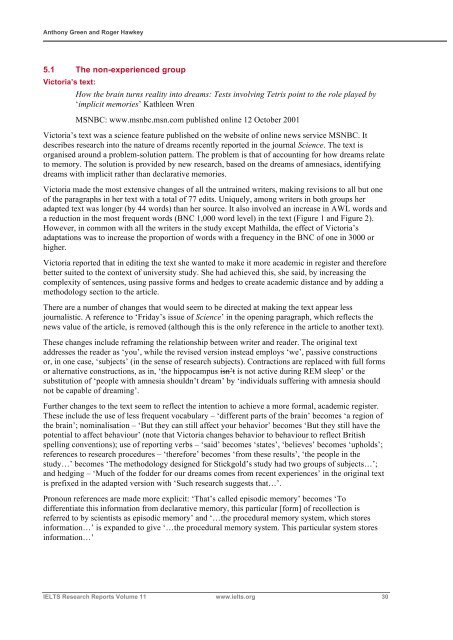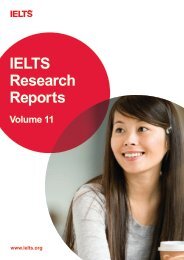An investigation of the process of writing IELTS Academic Reading ...
An investigation of the process of writing IELTS Academic Reading ...
An investigation of the process of writing IELTS Academic Reading ...
You also want an ePaper? Increase the reach of your titles
YUMPU automatically turns print PDFs into web optimized ePapers that Google loves.
<strong>An</strong>thony Green and Roger Hawkey<br />
5.1 The non-experienced group<br />
Victoria’s text:<br />
How <strong>the</strong> brain turns reality into dreams: Tests involving Tetris point to <strong>the</strong> role played by<br />
‘implicit memories’ Kathleen Wren<br />
MSNBC: www.msnbc.msn.com published online 12 October 2001<br />
Victoria’s text was a science feature published on <strong>the</strong> website <strong>of</strong> online news service MSNBC. It<br />
describes research into <strong>the</strong> nature <strong>of</strong> dreams recently reported in <strong>the</strong> journal Science. The text is<br />
organised around a problem-solution pattern. The problem is that <strong>of</strong> accounting for how dreams relate<br />
to memory. The solution is provided by new research, based on <strong>the</strong> dreams <strong>of</strong> amnesiacs, identifying<br />
dreams with implicit ra<strong>the</strong>r than declarative memories.<br />
Victoria made <strong>the</strong> most extensive changes <strong>of</strong> all <strong>the</strong> untrained writers, making revisions to all but one<br />
<strong>of</strong> <strong>the</strong> paragraphs in her text with a total <strong>of</strong> 77 edits. Uniquely, among writers in both groups her<br />
adapted text was longer (by 44 words) than her source. It also involved an increase in AWL words and<br />
a reduction in <strong>the</strong> most frequent words (BNC 1,000 word level) in <strong>the</strong> text (Figure 1 and Figure 2).<br />
However, in common with all <strong>the</strong> writers in <strong>the</strong> study except Mathilda, <strong>the</strong> effect <strong>of</strong> Victoria’s<br />
adaptations was to increase <strong>the</strong> proportion <strong>of</strong> words with a frequency in <strong>the</strong> BNC <strong>of</strong> one in 3000 or<br />
higher.<br />
Victoria reported that in editing <strong>the</strong> text she wanted to make it more academic in register and <strong>the</strong>refore<br />
better suited to <strong>the</strong> context <strong>of</strong> university study. She had achieved this, she said, by increasing <strong>the</strong><br />
complexity <strong>of</strong> sentences, using passive forms and hedges to create academic distance and by adding a<br />
methodology section to <strong>the</strong> article.<br />
There are a number <strong>of</strong> changes that would seem to be directed at making <strong>the</strong> text appear less<br />
journalistic. A reference to ‘Friday’s issue <strong>of</strong> Science’ in <strong>the</strong> opening paragraph, which reflects <strong>the</strong><br />
news value <strong>of</strong> <strong>the</strong> article, is removed (although this is <strong>the</strong> only reference in <strong>the</strong> article to ano<strong>the</strong>r text).<br />
These changes include reframing <strong>the</strong> relationship between writer and reader. The original text<br />
addresses <strong>the</strong> reader as ‘you’, while <strong>the</strong> revised version instead employs ‘we’, passive constructions<br />
or, in one case, ‘subjects’ (in <strong>the</strong> sense <strong>of</strong> research subjects). Contractions are replaced with full forms<br />
or alternative constructions, as in, ‘<strong>the</strong> hippocampus isn’t is not active during REM sleep’ or <strong>the</strong><br />
substitution <strong>of</strong> ‘people with amnesia shouldn’t dream’ by ‘individuals suffering with amnesia should<br />
not be capable <strong>of</strong> dreaming’.<br />
Fur<strong>the</strong>r changes to <strong>the</strong> text seem to reflect <strong>the</strong> intention to achieve a more formal, academic register.<br />
These include <strong>the</strong> use <strong>of</strong> less frequent vocabulary – ‘different parts <strong>of</strong> <strong>the</strong> brain’ becomes ‘a region <strong>of</strong><br />
<strong>the</strong> brain’; nominalisation – ‘But <strong>the</strong>y can still affect your behavior’ becomes ‘But <strong>the</strong>y still have <strong>the</strong><br />
potential to affect behaviour’ (note that Victoria changes behavior to behaviour to reflect British<br />
spelling conventions); use <strong>of</strong> reporting verbs – ‘said’ becomes ‘states’, ‘believes’ becomes ‘upholds’;<br />
references to research procedures – ‘<strong>the</strong>refore’ becomes ‘from <strong>the</strong>se results’, ‘<strong>the</strong> people in <strong>the</strong><br />
study…’ becomes ‘The methodology designed for Stickgold’s study had two groups <strong>of</strong> subjects…’;<br />
and hedging – ‘Much <strong>of</strong> <strong>the</strong> fodder for our dreams comes from recent experiences’ in <strong>the</strong> original text<br />
is prefixed in <strong>the</strong> adapted version with ‘Such research suggests that…’.<br />
Pronoun references are made more explicit: ‘That’s called episodic memory’ becomes ‘To<br />
differentiate this information from declarative memory, this particular [form] <strong>of</strong> recollection is<br />
referred to by scientists as episodic memory’ and ‘…<strong>the</strong> procedural memory system, which stores<br />
information…’ is expanded to give ‘…<strong>the</strong> procedural memory system. This particular system stores<br />
information…’<br />
<strong>IELTS</strong> Research Reports Volume 11 www.ielts.org 30

















